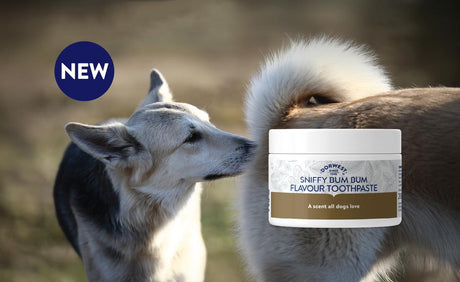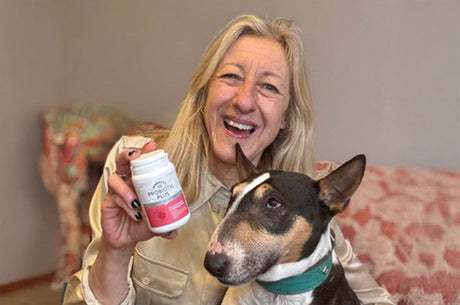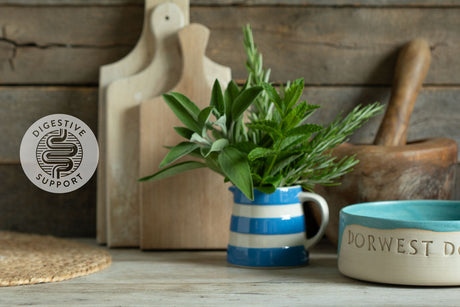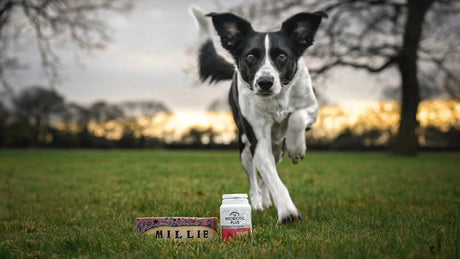
Stepping out into the world with your puppy on lead for their first walk is always an exciting day. It’s the start of a lifetime of adventures together. We’re often asked how much exercise do puppies need and if we should be walking our puppies in those early months. As much as you may be eager to get your puppy outside, it is crucial to be patient with this. Otherwise, it could negatively impact their growth and health in future.
So, how do we judge what’s appropriate for their age? We discuss our recommended advice and the important things to remember below.
Sticking to puppy exercise guidelines
First, let’s look at the physical side of things. You may have heard of the term “growth plates”, these are soft areas at the end of your puppy’s bones. It’s their job to fill up with cells to lay down new sections of bone to fill out your pup’s body as they grow. These eventually harden as they mature to become stable parts of your dog’s physical structure. Because of these soft areas, it’s important that we don’t over-do giving physical exercise to our puppies. This is only until those growth plates have completed their all-important job. Tiny and smaller dogs might be skeletally mature at 9/10 months, but much larger breeds could take up until 2 years.
Now, to answer the much talked about question. How much exercise do puppies need? A good rule of thumb offered by many vets is to keep walks to 5 minutes per month of your puppy’s age in length. For example, if you have a 3-month old puppy, stick to 15 minute walks and for a 6-month old puppy, 30 minute walks. These can be taken a couple of times a day, as long as your puppy gets plenty of sleep and rest in between. It’s important to be sensible and keep to softer ground and avoid too much road stomping or going up and down hills. This will help keep your puppy’s growth headed in the right direction.

Supporting your puppy with pet supplements
Puppy food supplements provide essential nutrients that support their immune system. When they are still developing, it’s important to make sure they build strong body defences. We recently launched our Dorwest Keeper’s Mix® Sensitive which is especially suited to puppies with sensitive tummies. This powerful yet gentle puppy food supplement is perfect for puppies in their early days. As their bodies are much more sensitive to new foods, our Keeper’s Mix® Sensitive is a great solution. It is packed with natural ingredients that work together to promote all-around health.
The impact the external environment has on your puppy
While most pet owners will focus on the physical side of walks, you should also consider the emotional impact of being out in the big wide world. For young puppies, those first few weeks of outdoor walks will bring a variety of new experiences.
There will be many sights, sounds and smells that they’ve not encountered before. Count up any new stimuli they encounter on an individual walk. You’ll soon understand why some puppies are a little timid in those early days. From traffic to people, to dogs, wildlife, livestock, buildings, there’s a lot to take in! When you break that down even further, it’s a lot for a puppy to experience all in one go. For example, for people alone that could mean babies (carried or in prams), children, males, females, the elderly. Then on top of that, add in all the different outfits they could be wearing. This could be anywhere from postal workers, to woolly hats, high-vis jackets, or walking sticks!
This is why it’s so important that your dog has a balance in their life. You shouldn’t only ask how much exercise do puppies need but also what will they encounter when doing so? Take both the physical stress on their body AND the emotional toll on their developing minds into account. A 25 minute quiet walk in an empty field may be better for your pup than a 5-minute walk alongside a main road. Even if you can’t take them outside for that long, you can still have fun at home with your dog!
The easy tell-tale signs
A good way to gauge how your puppy is coping with walks is to watch their behaviour when they get home. Do they calm down pretty fast and head for a snooze? Or do you end up with 10 mins of zoomies and their crocodile teeth getting a good workout on your hand? If it’s the latter, that’s probably a good indicator that the walk was either a little too long (and they’re over-tired) or a little too busy (and they’re stressed).
We want to get those first walks with our puppies just right. Our best advice is to follow the “short and sweet rule”. “Short”, so that it’s not impacting their physical growth. And “sweet” so they feel positive about the new experiences they enjoyed.
Puppy 101 With Caroline Wilkinson
We've recently teamed up with certified animal behaviourist and qualified dog trainer Caroline Wilkinson, founder of Barket Place. Here’s her latest video with some top behavioural and training tips to help you settle in the new addition to your family, and build the perfect relationship with your puppy.
At Dorwest Herbs, we offer a broad range of herbal pet care for dogs to support their health. Alongside our Dorwest Keepers Mix® Sensitive, we can also recommend the most suitable puppy food supplements. Browse our best-selling products online and get in touch with us on email info@dorwest.com or by calling +44 (0) 1308 897 27.







